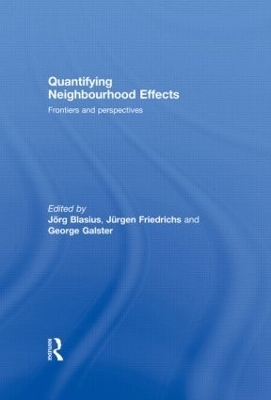
Quantifying Neighbourhood Effects
Routledge (Verlag)
978-0-415-47809-0 (ISBN)
Many policies in several Western European countries and the U.S. aim to counter spatial concentrations of deprivation and create more socio-economically mixed residential areas. Such policies are founded on the belief that neighbourhoods have a strong and independent effect upon the well-being and life-chances of individuals. The adequacy of the evidence base to support this position has been the subject of spirited debate on both sides of the Atlantic. The primary purpose of this book is to contribute to this policy-relevant discussion by presenting new scholarship from many countries that rigorously quantifies various sorts of neighbourhood effects through the use of cutting-edge social scientific techniques.
The secondary purpose of this book is to introduce these techniques to a wider array of housing and planning researchers and to show how a variety of disciplines have offered insightful, synergistic perspectives. Research on neighbourhood effects has over the last 15 years led to a body of knowledge extending far beyond the sociological urban research where it originated. The problem of quantifying neighbourhood effects and the use of associated methodologies (like multi-level analysis, instrumental variables) has attracted scholars from criminology, sociology, social geography, economics and health science, and thus serves as a critical locus for interdisciplinary scholarship.
This book was previously published as a special issue of Housing Studies.
Jörg Blasius is a Professor of Sociology at the Institute for Political Science and Sociology, University of Bonn, Germany. He currently serves as the president of RC33 (research committee of logic and methodology in sociology) of the International Sociological Association. Jürgen Friedrichs is Professor Emeritus of the Research Institute for Sociology at the University of Cologne, Germany. He serves as senior editor of the Kölner Zeitschrift für Soziologie und Sozialpyschologie. George Galster is the Clarence Hilberry Professor of Urban Affairs at the Department of Geography and Urban Planning, Wayne State University. His research has dealt with metropolitan housing markets, racial discrimination and segregation.
1. Introduction: Quantifying Neighbourhood Effects Jörg Blasius, Jürgen Friedrichs and George Galster
2. What mix matters? Exploring the relationships between individuals’ incomes and different measures of their neighborhood context Roger Andersson, Sako Musterd, George Galster and Timo M. Kauppinen
3. Mixed Tenure Communities and Neighbourhood Quality Ade Kearns and Phil Mason
4. Homeownership, poverty and educational achievement: school effects as neighbourhood effects Glen Bramley and Noah Kofi Karley
5. The Influence of Neighbourhood Poverty During Childhood on Fertility, Education, and Earnings Outcomes George Galster, Dave E. Marcotte, Marv Mandell, Hal Wolman and Nancy Augustine
6. Internal heterogeneity of a deprived urban area and its impact on residents’ perception of deviance Jörg Blasius and Jürgen Friedrichs
7. The effects of neighbourhood poverty on adolescent problem behaviours: A multi-level analysis differentiated by gender and ethnicity Dietrich Oberwittler
8. The socio-cultural integration of ethnic minorities in the Netherlands. Identifying neighbourhood effects on multiple integration outcomes Mérove Gijsberts and Jaco Dagevos
9. Intergenerational Neighbourhood-Type Mobility: Examining Differences between Blacks and Whites Thomas P. Vartanian, Page Walker Buck and Philip Gleason
| Erscheint lt. Verlag | 2.12.2008 |
|---|---|
| Zusatzinfo | 20 Tables, black and white |
| Verlagsort | London |
| Sprache | englisch |
| Maße | 174 x 246 mm |
| Gewicht | 600 g |
| Themenwelt | Wirtschaft ► Volkswirtschaftslehre ► Mikroökonomie |
| ISBN-10 | 0-415-47809-X / 041547809X |
| ISBN-13 | 978-0-415-47809-0 / 9780415478090 |
| Zustand | Neuware |
| Haben Sie eine Frage zum Produkt? |
aus dem Bereich


